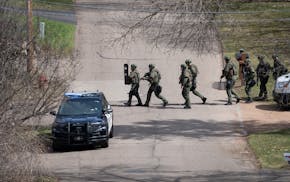After seven years in the spotlight, it's little wonder that Eric Kaler is craving a little quiet time in his lab.
He was, after all, an award-winning scientist long before he became president of the University of Minnesota in 2011.
And now, at 61, he's making plans to return to life as a professor when he wraps up his current tour of duty.
Yet Kaler insists he has no intention of coasting through his final year as head of Minnesota's flagship university. "I'm not going to limp out the door as a lame duck," he says. "I'm going to finish what's in front of me."
In his first in-depth interview since his surprise announcement, Kaler had no regrets about his decision to end his presidency next summer, a year before his contract would have expired in 2020.
"By the end of next year, I will have done everything that I can do," he said. "I could have marked time and finished out my contract year, but I decided to accelerate this and let a new person come and get on jump on it."
His plan, after stepping down next July, is to spend a year as president emeritus to help finish a $4 billion fundraising campaign that began early in his presidency and after a six-month sabbatical, become Professor Kaler again in January 2021.
After more than a decade as a university provost and president, Kaler jokes that he'll have to brush up on "some of my more rusty skills" before returning to the classroom. "That's why I'm taking a sabbatical."
It was at the U, as a graduate student nearly 40 years ago, that Kaler says he abandoned his original goal — to become a "the youngest vice president at Exxon Corporation" — for a career in academia. While earning his doctorate in chemical engineering, he said, he taught a class called "Process Control" and was hooked.
When he returned decades later as U president, after rising through the ranks at three other universities, Kaler called it his "dream job." He remembers walking across the Washington Avenue bridge on his inauguration day in 2011, greeting students and faculty with a sense of awe. "That was a favorite," he said.
Successes and regrets
Looking back on his seven years in office, Kaler points with pride to a list of accomplishments: record graduation rates, research funding, philanthropic donations, and especially his track record holding down undergraduate in-state tuition, which, after years of double-digit increases, has grown by an average of 1 percent a year — the slowest rate, he says, "since the Eisenhower administration." And the average student debt, for the first time in years, has actually declined at the U.
"I'm very proud of my overall record here, actually, without being boastful," he said. "I feel like I've had a pretty successful run."
But he also notes, with some frustration, that many of the accomplishments have been drowned out by negative headlines that have dogged the U in the past few years, particularly about sexual misconduct and the athletics department.
He cites, as an example, the scandal that cost former athletic director Norwood Teague his job. Teague admitted to inappropriate behavior after two female colleagues accused him of sexual harassment, including groping and sending sexually explicit text messages, at a retreat for U leaders.
Kaler defended his handling of the case, noting that Teague was out of a job within two weeks of the incident, "which is a remarkably fast time," he said. "The guy did a bad thing; he lost his job for it. The university responded in a strong way."
Shroud hung over U
He has also vigorously defended the university's handling of an alleged gang rape involving members of the Gophers football team in 2016. While no one was charged with a crime, the U expelled or suspended five players for violating the student code of conduct, a move that drew both praise and criticism as well as months of bad press.
"In most all of these instances that a bad thing has happened, we've handled them with transparency, with alacrity and appropriately," Kaler said.
His biggest regret, Kaler said, had nothing to do with sexual misconduct or the athletics department. It was the case of Dan Markingson, a 26-year-old psychiatric patient who committed suicide while in a drug study at the U in 2004. Kaler, who arrived at the U seven years later, said he knew that Markingson's family and others were raising concerns about the psychiatry department's role in the tragedy. But he was convinced that the concerns were unfounded, he said, until, under mounting pressure, the U hired outside experts to review the case.
"Reading that evaluation was very difficult," he admitted. The 2015 review, as well as a scathing report by the Legislative Auditor, faulted the U for failing to protect vulnerable patients like Markingson from being coerced into drug studies.
"It was a devastatingly bad situation, and frankly one I should have looked at much sooner," said Kaler. After it came out, he added, he and his wife, Karen, paid a visit to Markingson's mother. "And I apologized to her for the loss of her son."
Today, as the Board of Regents turns its attention to finding his successor, Kaler says he plans to spend the next year on some ongoing projects: cementing a new partnership between the medical school and the Fairview medical system, and rolling out the first phase of a new strategic plan for all five campuses.
Advice for successor
Beyond that, he said, he'll be preparing to hand over the reins to the next president.
If asked, he said, he would offer this advice to his replacement: "Ask lots of questions, and question the answers you get," he said.
Realistically, he added, no one person possesses all the skills needed for a job like this.
"The next president will be good in some of those areas, bad in others and will grow strengths as his or her term continues," he said. "The most important thing you can do is hire the right people to surround you. That's what good leaders do."
Maura Lerner • 612-673-7384

Wisconsin Republicans ignore governor's call to spend $125M to combat 'forever chemicals'

FAFSA completions in Minnesota drop amid flawed efforts to update college financial aid form

Man killed in Minnetonka by law enforcement started gun battle with deputies, BCA says

